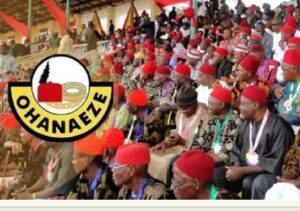Igbos Should Be Allowed to Take Part in Lagos Politics – Ohanaeze Leader
Igbos Should Be Allowed to Take Part in Lagos Politics – Ohanaeze Leader

Dr. Solomon Ogbonna Aguene, President of Ohanaeze Ndigbo in Lagos State, has expressed deep concern over what he sees as the persistent political sidelining of the Igbo community in Lagos, despite their substantial economic contributions to the state.
In a statement made at his Ikoyi residence on Saturday, following an assessment of the local government elections, Dr. Aguene criticized the repeated exclusion of Igbos from participating fully in the political process. He alleged that members of the Igbo community are frequently denied both the right to vote and the opportunity to run for grassroots political offices such as councillor or local government chairman.
“Many Igbos living in Lagos are systematically denied the chance to exercise their voting rights,” he said. “This has become a pattern during every election. It’s not just about voting — they are also prevented from contesting for key political roles at the local level.”
Dr. Aguene pointed out the imbalance between the Igbos’ economic input in Lagos and their lack of political representation. While a few may hold minor positions like vice chairmanships in local councils, he argued that such tokenism does not reflect the depth of the community’s contribution to the state’s development.
“Our people are major investors in this city. They fuel the economy, yet they are shut out when it comes to decision-making,” he emphasized.
He further stated that such exclusion is at odds with democratic ideals, which are built on fairness, equity, and inclusive governance.
“When a system consistently denies certain groups a seat at the table, it’s hard to call it a democracy. What we see instead is a power structure dominated by opportunists,” he said. “The result is widespread voter apathy — people are tired of casting ballots that make no difference.”
Dr. Aguene didn’t hold back in his broader critique of governance in Nigeria, describing it as serving only a privileged minority. He highlighted the dire living conditions faced by ordinary Nigerians, including essential workers like journalists and security personnel, who struggle to meet basic needs.
“In this country, governance has become exclusive. The masses are suffering while a select few enjoy the benefits. Even workers in critical sectors can’t afford decent housing or provide for their families. The situation is dire.”
TRENDING SONGS
 NPMA Appeals to Nigerian Government for Compensation After Lagos Market Fire
NPMA Appeals to Nigerian Government for Compensation After Lagos Market Fire
 Rest Every Four Hours, FRSC Issues Safety Guide for Fasting Motorists
Rest Every Four Hours, FRSC Issues Safety Guide for Fasting Motorists
 NNPC Boss Ojulari Bags UK Energy Institute Fellowship
NNPC Boss Ojulari Bags UK Energy Institute Fellowship
 Shock in Anambra: Bride Disappears Moments Before Wedding
Shock in Anambra: Bride Disappears Moments Before Wedding
 Nigerian Woman Returns ₦330 Million Accidentally Credited to Her Account
Nigerian Woman Returns ₦330 Million Accidentally Credited to Her Account
 APC Don Reach Morocco?’ VeryDarkMan Reacts to Seyi Tinubu Poster
APC Don Reach Morocco?’ VeryDarkMan Reacts to Seyi Tinubu Poster
 Bride Breaks Down in Tears as Wedding Meals Were Kept Secretly While Guests Go Home Hungry
Bride Breaks Down in Tears as Wedding Meals Were Kept Secretly While Guests Go Home Hungry
 Odogwu by Day, Robber by Night: How Marriage Joy Turned Into Tragedy
Odogwu by Day, Robber by Night: How Marriage Joy Turned Into Tragedy
 Nigerian Officials Allegedly Pocket N4–6B Weekly Through Smuggling Cartels at Seme–Badagry Border
Nigerian Officials Allegedly Pocket N4–6B Weekly Through Smuggling Cartels at Seme–Badagry Border
 Ahmad Yerima: Naval Officer to Face No Sanctions After Clash with Wike – Matawalle
Ahmad Yerima: Naval Officer to Face No Sanctions After Clash with Wike – Matawalle
Share this post with your friends on ![]()













